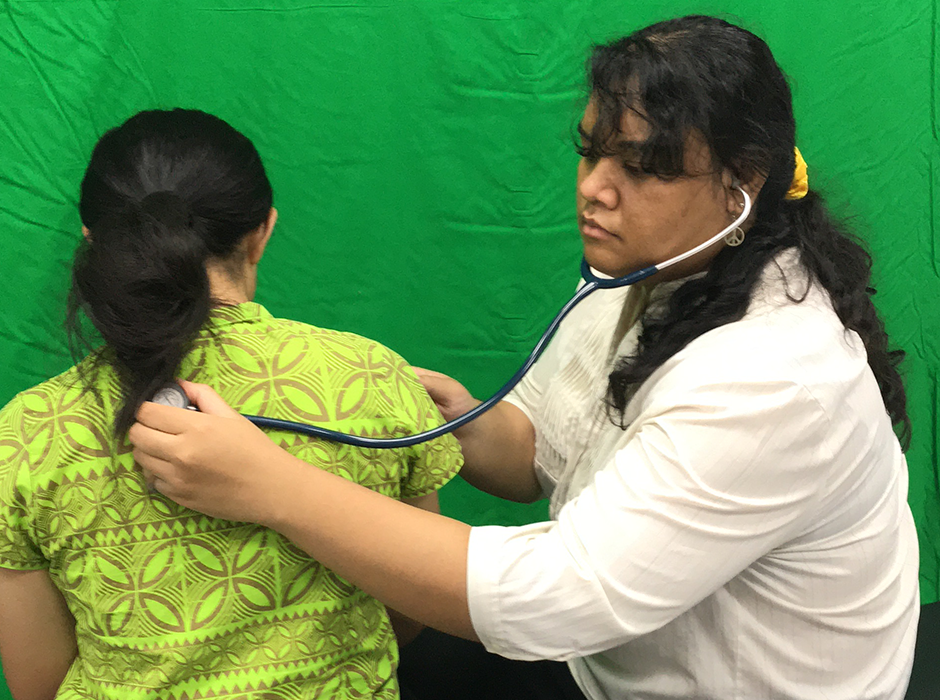
Masters student Eliana Viali, on the right, is believed to be the first person to carry out research on Samoan stroke patients and their perspectives around physical activity as treatment.
Masters student Eliana Viali is helping fill an important knowledge gap in the South Pacific – she’s believed to be the first to carry out research on Samoan stroke survivors and their perspectives around physical activity as treatment.
Before her, “zero research” had been conducted in this area, she says.
Eliana first attended Otago University as a Manaaki Scholar in 2014 and graduated with a Bachelor of Physiotherapy in 2019.
She returned home to Samoa and worked for several months as part of a six-person physiotherapy team in the Tupua Tamasese Meaole Hospital helping treat stroke patients, as well as people with cellulitis, diabetes, cardiorespiratory conditions and a range of other conditions.
Eliana quickly noticed there were big differences in how Samoan patients with stroke responded to her treatment, motivating them to engage in physical activity. So, in the second half of 2020, she looked to Otago to upskill in that area, and undertook, by distance, a postgraduate certificate of Physiotherapy endorsed in Neurological rehabilitation– again as a Manaaki Scholar.
“Because we were stretched thin at our department, I wanted to make sure that I had access to the latest research about how to treat Samoan patients,” she says.
She intended to only take two papers to help with her skills for her team, but quickly realised “zero research” had been carried out on how Samoan stroke patients respond to physical activity as treatment.
Eliana and her paper coordinator Dr Ally Calder, now supervisor, decided it would be best to upgrade her course to a masters by thesis so she could thoroughly investigate the relationship between Samoan stroke survivors and physical activity as treatment.
Commitments to her family, church and friends meant she had to put her masters work on hold for a while, but Eliana arrived in Ōtepoti in February 2024, will be handing in her thesis in February 2025 to fulfil the requirements for the degree Masters of Physiotherapy.
Eliana says she met many great people during her time in Samoa and across the Pacific.
“My greatest take away from my time in the Pacific was that I always need to be prepared, in case I am called upon to treat someone, to stand up and present or teach, or to serve in any capacity.”
After Tupua Tamasese Meaole Hospital, Eliana worked in private practice treating patients with musculoskeletal injuries, sore joints, and movement disorders before setting up her own business, Aligned Physiotherapy Samoa.
She contracted her services to private clinics, worked as a sports medic for local sports federations and worked as a consultant for larger sports organisations. She also taught sports education courses in Samoa, Fiji, Solomon Islands and Tonga for the Oceania Sport Education Program under the Oceania National Olympic Committee.
“Just prior to moving to Dunedin, I travelled with the Samoa Archery team to the Pacific Games in the Solomon Islands as their physiotherapist and it was a wonderful time.”
She feels fortunate she was able to create her own masters thesis topic.
“Through my research I have learnt about what matters to Samoan people when it comes to health care in New Zealand, how to become an advocate for change on their behalf, and how important it is that I am here.”
Eliana really enjoys research and can see herself becoming an academic in the future.
“At least once a week I reflect and feel an overwhelming sense of gratitude at the fact that I am being financially supported to study. A line I often think to myself is “I can’t believe I get paid to think! To learn! To grow!”
The best part of her time in Ōtepoti is the people she has met.
“My supervisory team has been nothing short of epic. Dr Ally Calder, Mr Elijah Areli and Dr Troy Ruhe have been instrumental in my personal and professional success this year. I often tell them that I forget that they are my supervisors because we have such an outstanding friendship.
“This sentiment is the same for all the lecturers and academic staff that I’ve come to know in the School of Physiotherapy. I feel enriched for knowing them.”
She says she has met many Pacific and Māori postgraduate students who have become close friends.
“Our mutual desire for creating a better future for our people has brought us closer and has helped me remember why I chose to become a researcher.”
Her fellow Manaaki Scholars have made her time in Ōtepoti a lot of fun.
“We hang out every month to make sure that we are keeping up with each other and to see if we can be of support to each other. I am so grateful for their friendship - I am excited to one day travel to visit them in their home countries!”
The International Student Support team host a Completion Ceremony at the end of each semester for Manaaki Scholars to attend, International Student Support Team Leader Simone Freeman says.
“The Manaaki Scholars’ Completion Ceremony is an absolute highlight for me and my team. Accompanying scholars from when they first arrive from their home country into New Zealand to the point where they are ready to complete their qualification is a wonderful part of our roles,” Simone says.
“Their stories are a testimony to their hard work and resilience, and we love celebrating their achievements with them. We are excited about the next cohort of scholars joining us at Otago in 2025.”
Click here to here to read about another Manaaki Scholar, Alejandro Maldonado
The Manaaki New Zealand Scholarships provide opportunities for international students to study in Aotearoa New Zealand. The scholarships are offered to eligible citizens from developing countries and can be used for undergraduate or postgraduate study at universities or institutes of technology within Aotearoa.